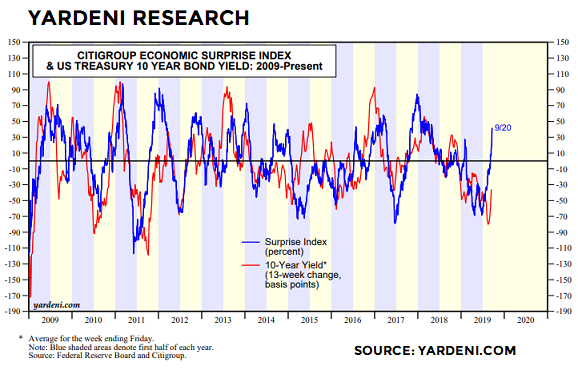The Road Ahead May Be Brighter Than Expectations
THE BIG PICTURE
Recent data seems to cast doubt on the seemingly never-ending call for an imminent recession. From a September 20, 2019 Bloomberg article:
“The U.S. economy is outperforming expectations by the most this year, offering a fresh rebuttal to last month’s resurgent recession fears fueled by the trade war and a manufacturing slump. The Bloomberg Economic Surprise Index has reached an 11-month high after four indicators released Thursday, including existing home sales and jobless claims, each surpassed expectations.”
The Global Dow seems to support the “it is not that bad” theory. The index has thus far held above an important area of possible support.
SIMILAR PATTERNS IN 2011-2012 AND 2015-2016
It was not difficult to find calls for an imminent recession in both the 2011-2012 and 2015-2016 periods (see dated headlines below).
In both periods there were legitimate reasons to be concerned and significant corrections in global stocks, similar to the October-December 2018 period. With economic data starting to exceed expectations, it is possible global stocks will break out as they did following corrections in 2011 and 2015.
ECONOMIC DATA AND BONDS
The Yardeni Research chart below shows the Citigroup Economic Surprise Index in blue and the yield on a Ten-Year Treasury in red. Low yields typically align with economic fear. Given the recent improvement in economic data, it is possible yields will once again follow the Economic Surprise Index higher.
Data related to the U.S. economy has been improving for some time now allowing the Economic Surprise Index to gain meaningful traction. From a September 10, 2019 CNBC article:
“The Citi Economic Surprise Index, after nearing its lowest level in two years in June, this week was at its highest point since February. The index looks at actual economic readings against consensus forecasts, so it will rise when expectations are too low and fall when optimism runs too strong. The latest move, then, can be seen as a recalibration of Wall Street’s overriding pessimism.”
SETUPS IN PLACE FOR MONSTER BREAKOUT
While China remains an obvious and important wildcard, this week’s stock market video provides numerous forms of evidence that tell us to remain open to much better than expected outcomes over the next twenty-four months. Topics covered include: the labor market, Fed, long-term S&P 500 trends, valuations, breadth thrusts, better than expected economic releases, credit spreads, sentiment, and the VIX.
Bulls Have Setups In Place For Monster Breakout
CHINA WILDCARD IN FOLLOW-THROUGH EQUATION
History Says Stocks Can Perform Very Well After Big Oil Shocks
HOW CONCERNING IS THE RECENT SPIKE IN OIL PRICES?
Monday’s news was filled with blurbs similar to the one below from CNBC:
“Stocks fell on Monday amid fears that a surge in oil prices following an attack in Saudi Arabia could slow down global economic growth.”
Thus, it may be helpful to know how stocks have performed after big one-day spikes in the price of oil. Charlie Bilello’s Twitter feed (@CharlieBilello) contains dates of the largest one-day spikes in the price of oil (1983-2019).
HOW DID STOCKS PERFORM WALKING FORWARD?
Instead of marking the end of civilization as we know it, in most cases, the stock market posted satisfying returns after one-day spikes in the price of oil. In fact, 100% of the cases below featured significantly higher stock prices two years from the date of the “concerning” spike in oil prices. The median gain two years later was 32.82% and the worst case saw stocks rise by 12.92%. The present-day case will follow a unique path, but history tells us not to be overly concerned about Monday’s pop in oil.
TESTING THE LONGER-TERM BULLISH HYPOTHESIS
The stock market provided a clear “be open to better than expected outcomes” signal in January 2019 after market participants created a rare breadth thrust. Did last week’s shifts related to value vs. growth and interest rates negate the longer-term bullish breadth thrust thesis? You can decide after watching this week’s video.
REALISTIC EXPECTATIONS
While life would be easier if it were not the case, in the real world the stock market is a volatile and difficult-to-tame animal. Having realistic expectations about a wide range of scenarios, including those on the bearish side of the ledger, can help us avoid emotional surprises. Based on numerous timeframes, a push back toward 2880-ish on the S&P 500 would not be shocking, even under a longer-term bullish scenario.
As always, we will continue to take it day by day and see how the data unfolds in the coming days, weeks, and months.








